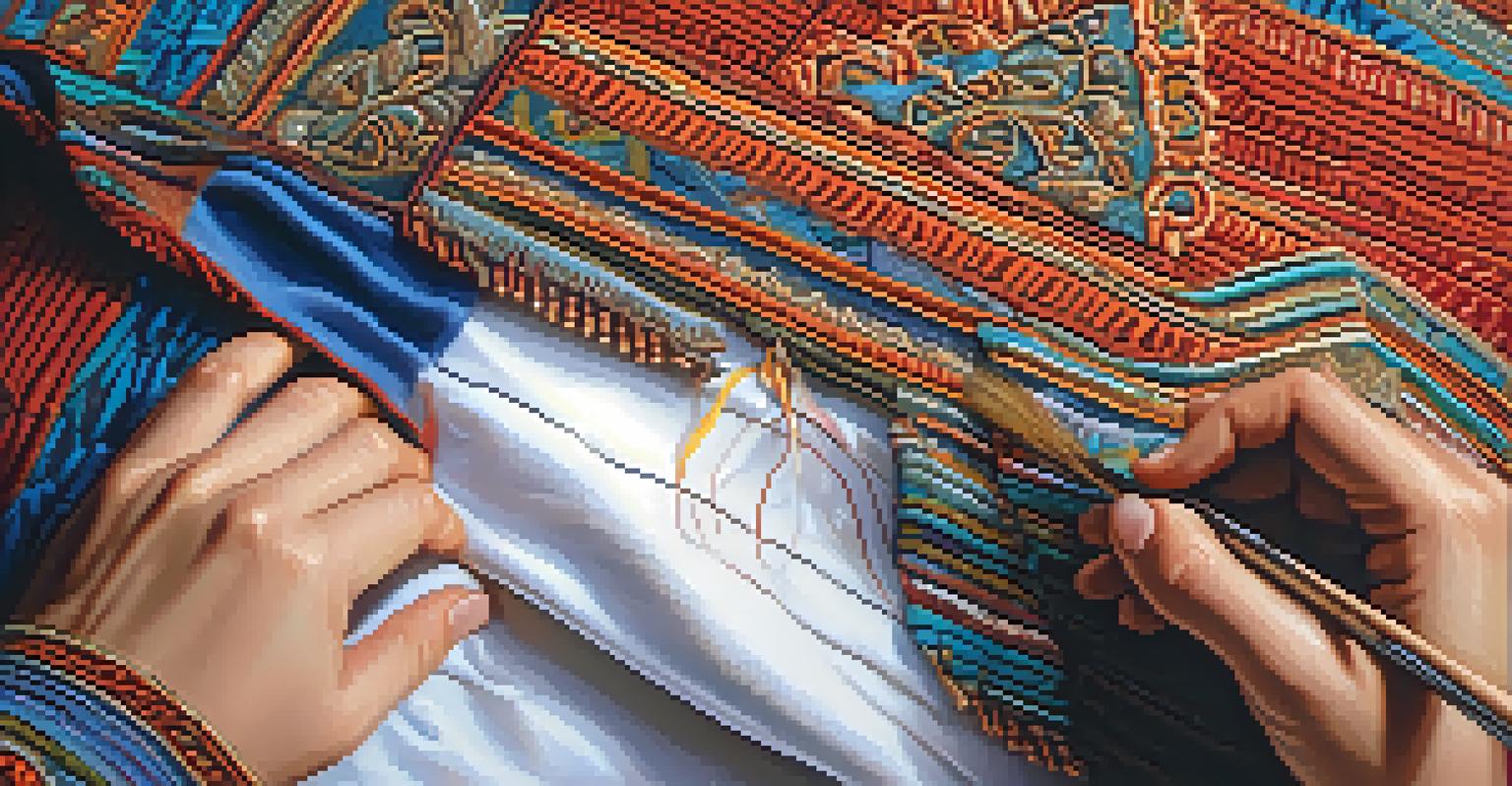Cultural Sensitivity in Global Fashion Supply Chains

Understanding Cultural Sensitivity in Fashion
Cultural sensitivity refers to the awareness and respect for different cultural practices and values. In the fashion industry, this concept is crucial as brands often source materials and labor from diverse regions. By understanding the local customs and traditions, fashion companies can create products that resonate with their target consumers while avoiding cultural appropriation.
Fashion is the armor to survive the reality of everyday life.
For example, a brand that designs clothing inspired by Indigenous art must collaborate with those communities to honor their traditions. This not only ensures authenticity but also fosters goodwill and strengthens relationships. By embracing cultural sensitivity, brands can build trust and loyalty among their customers.
Ultimately, cultural sensitivity in fashion is about more than just avoiding offense; it's about creating a dialogue and celebrating diversity. This practice can lead to innovative designs that reflect a rich tapestry of cultures, making the fashion world more inclusive and vibrant.
The Impact of Globalization on Fashion Supply Chains
Globalization has transformed the fashion industry, enabling brands to source materials and labor worldwide. However, this interconnectedness also presents challenges regarding cultural sensitivity. As companies expand into new markets, they often encounter unfamiliar cultural norms that can lead to misunderstandings and misrepresentations.

For instance, a clothing line marketed in Western countries may not resonate with consumers in Asia due to variations in cultural preferences. Brands must conduct thorough market research to understand these nuances. This approach helps avoid cultural faux pas that could harm a brand's reputation and alienate potential customers.
Cultural Sensitivity is Essential
Understanding and respecting diverse cultural practices is crucial for fashion brands to avoid cultural appropriation and build trust with consumers.
As globalization continues to evolve, the need for cultural sensitivity will only grow. Fashion companies that prioritize understanding and respecting local cultures will be better positioned to thrive in diverse markets, creating a more sustainable and socially responsible business model.
Cultural Appropriation vs. Appreciation in Fashion
Cultural appropriation occurs when elements of one culture are used by another, often without permission or understanding. In contrast, cultural appreciation involves a respectful and informed engagement with those cultural elements. The fashion industry has faced criticism for instances of appropriation, highlighting the need for greater sensitivity.
Style is a way to say who you are without having to speak.
A well-known example is when a Western brand incorporates traditional garments from another culture into its collection without acknowledging their significance. This can lead to feelings of exploitation among the original culture's members. To avoid this, brands should strive to collaborate with the communities they draw inspiration from, ensuring that their designs honor those cultures.
By fostering cultural appreciation rather than appropriation, fashion brands can create meaningful connections with diverse communities. This approach not only enriches their designs but also demonstrates a commitment to ethical practices, paving the way for a more inclusive fashion landscape.
The Role of Ethical Practices in Fashion Supply Chains
Ethical practices are essential for building cultural sensitivity within fashion supply chains. This includes ensuring fair labor conditions, sustainable sourcing, and respect for local cultures. Brands that prioritize ethics can avoid potential cultural insensitivity and foster positive relationships with their suppliers.
An example of this is a brand that works closely with artisans in a specific region, providing fair wages and supporting local craftsmanship. This not only empowers the community but also enriches the brand's offerings with authentic, culturally significant products. Such collaborations can lead to innovative designs that celebrate cultural heritage.
Ethical Practices Enhance Trust
Prioritizing fair labor conditions and sustainable sourcing not only fosters positive relationships with suppliers but also attracts ethically conscious consumers.
Moreover, consumers are increasingly drawn to brands that demonstrate ethical practices. By aligning their business models with cultural sensitivity and ethics, fashion companies can enhance their brand reputation and appeal to a broader audience, ultimately driving sales and loyalty.
Consumer Awareness and Cultural Sensitivity
Today's consumers are more informed and conscious of cultural sensitivity than ever before. They actively seek brands that respect and celebrate cultural diversity. By understanding this trend, fashion companies can tailor their marketing strategies to resonate with consumers who value ethical practices.
For instance, campaigns that highlight collaborations with local artisans or that tell the stories behind cultural designs can attract attention and foster customer loyalty. By showcasing their commitment to cultural sensitivity, brands can differentiate themselves in a crowded market.
In this age of information, it’s essential for brands to engage in transparent practices. By openly sharing their sourcing processes and cultural collaborations, companies can build trust with their audience, ultimately leading to a stronger brand reputation and customer base.
Case Studies: Brands Getting Cultural Sensitivity Right
Several fashion brands have successfully embraced cultural sensitivity, setting examples for others in the industry. For instance, brands like Stella McCartney have prioritized sustainable practices while respecting local cultures. Their collaborations with Indigenous communities not only honor traditional craftsmanship but also promote ethical practices.
Another example is Nike, which has worked with local artists to create culturally relevant designs that celebrate their heritage. By involving these communities in the design process, Nike not only validates their cultural significance but also resonates with consumers who appreciate authenticity.
Future Trends Embrace Diversity
As fashion evolves, brands that prioritize cultural sensitivity and respect will thrive by appealing to a diverse and informed consumer base.
These case studies illustrate that cultural sensitivity can lead to innovative and successful fashion lines. By learning from brands that prioritize cultural respect, other companies can adopt similar practices, contributing to a more inclusive and diverse fashion industry.
Future Trends in Cultural Sensitivity and Fashion
As the fashion industry continues to evolve, cultural sensitivity will play an increasingly vital role in shaping future trends. With the rise of digital platforms, consumers have access to a wealth of information about cultural practices, making it imperative for brands to stay informed and respectful.
Emerging technologies, such as virtual reality and augmented reality, may also enhance cultural experiences in fashion. Brands can use these tools to educate consumers about the cultural significance of their designs, fostering a deeper appreciation for diversity.

Ultimately, the future of fashion lies in its ability to adapt and embrace cultural sensitivity. By prioritizing respect and understanding, brands can create a more inclusive industry that celebrates the richness of global cultures while appealing to a diverse consumer base.